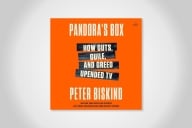You have /5 articles left.
Sign up for a free account or log in.
Whenever someone in my family complains to each other about something in our lives, our usual family response is to say “First World problem.”
We have lots of First World problems in our family. Right now, my wife can’t get texting to work properly on her new Android phone. Our Comcast cable internet will randomly buffer when we are trying to watch online video, even though I sprung for the Extreme 150mbps down Blast! service. The air conditioning has completely stopped working in our 2004 Honda Pilot. And the dog seems to treat her new PetSafe PIF00-12917 Stay and Play Wireless Fence as something of a joke.
This is the reason that I am not ashamed to tell you about the First World problem that I had with Audible.com this weekend.
Before I dive into the problem (which you really won’t care about anyway), a word on why it is important to pick on Audible whenever possible.
The reason: Amazon. Or more precisely, Amazon’s dominance of the digital book ecosystem.
Amazon owns Audible. Between the Kindle e-readers / books and the Audible audiobooks - Amazon owns a de facto monopoly on the digital book market. Mostly, the consumer seems to have benefited from this digital book monopoly. New books can be had cheaper than ever before. The number of audiobook titles is growing quickly. Whispersync, the name for the Amazon technology that seamlessly syncs up Kindle and Audible books, is just wonderful. (Although far too few titles are Whispersync enabled).
The problem with a monopoly is that eventually it bites the consumer in the ass. AT&T’s monopoly stifled innovation in communications and kept prices high for decades. We seem to be benefiting now from Amazon’s control of the digital book market, but a lack of competition will eventually result in higher prices and less quality service.
In the world of digital books, the existence of an Amazon de facto monopoly matters. Books represent not only private consumption goods, but public cultural assets as well. Our society’s cultural wealth is intimately tied up with the availability, breadth, and diversity of our books.
The move from physical to digital books has put our libraries, both public and academic, at a disadvantage. Amazon has refused to work with public and academic libraries to make digital books available for borrowing at anywhere near the same price or convenience that these books can purchased on Amazon’s platforms. The process of finding, acquiring, and reading a book is now more friction free than at any point in our history - but only for those of us who can afford to tap into this digital book bounty. The digital divide has come to books.
Okay, back to my First World problem with Audible. On Saturday morning I purchased the audiobook The Moral Case for Fossil by Alexi Epstein.
I purchased the audiobook from Audible.com with one of my credits from my Platinum Plan. (You give Audible $229.50, you get to download 24 audiobooks. This works out to about $9.56 per book).
The purchase went through. The credit was removed from my account. And then no book showed up. Normally, the audiobook is instantly ready to download on the Audible app on my iPhone. No audiobook. No audiobook in my Audible Library as well.
When I contacted Audible customer support they said that they cannot help me. Here is the relevant portion from the transcript of the chat I had with the Audible customer support person:
Audible Customer Support: “After reviewing your account, I'm seeing that your order is in a Pending status. As such, it hasn’t arrived in your library as yet. Due to the nature of your issue, I’ll need to transfer your information to an account specialist, they don’t have phone or chat support.
You can expect an e-mail response from them within the next 1-2 business days.;
This is a very rare system issue on our end. We are currently working on it. As soon as it is resolved, you will be notified.”
The Audible customer support person then refunded my credit. The audiobook was put back in my Audible Wish List.
Usually, I am annoyed at Amazon when, a) an Audible version of the book is not available, or b) there is an audiobook, but no Whispersync. (Although this may not be totally fair, as the choice to make an audiobook version rests with the publisher, not Amazon).
Now I was annoyed at Amazon because I couldn’t listen to the book I wanted. Actually, I would rather read by going back and forth between the Kindle and the audiobook, but for whatever reason (that I still don’t understand), Amazon chose not to make this title Whispersync enabled.
In the world of digital we are accustomed to instant gratification. We expect our digital goodies to arrive when we purchase or borrow them. Waiting seems so 20th century. How this digital impatience will play out in the expectations of today’s college students is probably predictable. The transition from physical to digital has raised our expectations for speed, and eroded our patience for delays.
What are some of your First World problems in the new digital economy?
Whose job is it in higher education to think about, and maybe fight against, the Amazon digital book monopoly?
What books did you download this weekend?

Want articles like this sent straight to your inbox?
Subscribe to a Newsletter







